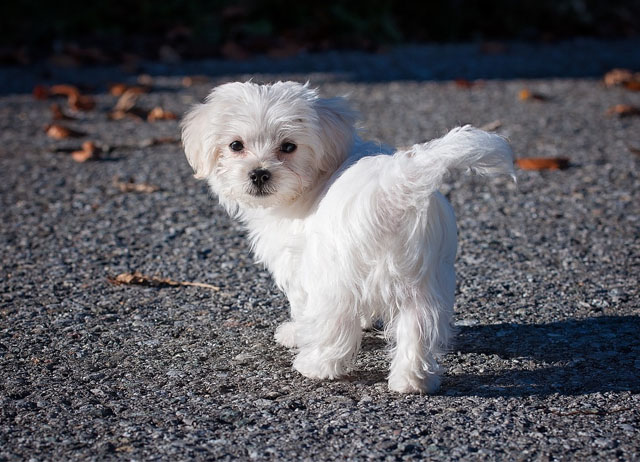



When it comes to training a Maltese, it's important to start as early as possible. The earlier you begin training, the easier it will be to establish good habits and behaviors. One of the most effective training techniques for a Maltese is positive reinforcement. This involves rewarding your dog with treats, praise, and affection when they exhibit the desired behavior. By using positive reinforcement, you are encouraging your Maltese to repeat the behavior in the future.
Consistency is crucial when training a Maltese. This means using the same commands, gestures, and rewards every time you train your dog. By being consistent, you are helping your Maltese understand what is expected of them and what behaviors are rewarded. Inconsistency can lead to confusion and make the training process more difficult.
Maltese dogs have a short attention span, so it's important to keep training sessions short and frequent. Aim for sessions that last no longer than 10-15 minutes, and try to train your Maltese at least once or twice a day. By keeping the sessions short and frequent, you are more likely to hold your dog's attention and make the training process more effective.
Socialization is a crucial aspect of training for any dog breed, including the Maltese. It's important to expose your Maltese to different people, animals, and environments from a young age. This will help them become more comfortable and confident in various situations. Socialization can also help prevent behavioral issues such as fear or aggression towards other dogs or people.
One of the first things you should teach your Maltese is a bathroom routine. Establish a designated bathroom area for your dog, and take them outside regularly to eliminate. Use a consistent command, such as "go potty," to signal to your Maltese what you want them to do. Be patient and consistent with this training, and reward your dog when they successfully eliminate in the designated area.
Using a crate or pen can be a helpful tool for house training your Maltese. Dogs naturally avoid soiling their sleeping area, so a crate or pen can help teach your Maltese to hold their bladder and bowels. Make sure the crate or pen is the appropriate size for your Maltese, and provide them with comfortable bedding and toys. Gradually increase the amount of time your Maltese spends in the crate or pen, and always take them outside to eliminate immediately after being released.
Teaching your Maltese basic commands is an essential part of their training. Start with simple commands such as sit, stay, and come. Use treats and praise to reward your Maltese when they successfully follow a command. Be patient and consistent with your training, and gradually increase the difficulty of the commands as your Maltese progresses.
A clicker or verbal marker can be a useful tool when training a Maltese. A clicker is a small device that makes a distinct clicking sound, while a verbal marker can be a specific word or sound that you use to signal to your Maltese that they have done something correctly. By using a clicker or verbal marker, you can more effectively communicate with your Maltese and reinforce desired behaviors.
Training a Maltese requires patience and understanding. Remember that your dog is learning and may not always get things right immediately. Be patient with your Maltese and provide them with clear and consistent guidance. Avoid getting frustrated or angry, as this can hinder the training process and create a negative association with training for your dog.
The tone of your voice can have a significant impact on your Maltese's response to training. Use a gentle and calm tone of voice when giving commands or corrections. Avoid yelling or using harsh tones, as this can cause your Maltese to become fearful or anxious. A gentle tone of voice will help create a positive and trusting environment for your dog.
Punishment is not an effective or humane training method for a Maltese. Avoid using physical punishment or harsh corrections, as this can damage the trust and bond between you and your dog. Instead, focus on positive reinforcement and reward-based training techniques. This will create a positive and enjoyable training experience for your Maltese.
Maltese dogs are intelligent and curious, so it's important to provide them with mental stimulation. This can include puzzle toys, interactive games, and training exercises that challenge their minds. Mental stimulation not only keeps your Maltese entertained, but it also helps prevent boredom and destructive behaviors.
If you are struggling with training your Maltese or if you want to take their training to the next level, consider enrolling them in obedience classes or hiring a professional trainer. Professional trainers have the knowledge and experience to address specific training issues and can provide guidance tailored to your Maltese's needs.
Leash training is an important skill for a Maltese to learn. Start by introducing your dog to the leash and collar in a positive and gradual manner. Use treats and praise to reward your Maltese for walking calmly on the leash. Practice walking on a loose leash and gradually increase the duration and difficulty of your walks. Be patient and consistent with leash training, and always make sure to use a comfortable and properly fitted leash and collar.
Maltese dogs require regular grooming and handling, so it's important to train them to be comfortable with these activities. Start by gently touching and handling your Maltese's paws, ears, and body. Gradually introduce grooming tools such as brushes and nail clippers. Reward your Maltese with treats and praise for remaining calm and cooperative during grooming sessions. This will help make grooming a positive and stress-free experience for both you and your dog.
Establishing yourself as the pack leader is important for maintaining control and discipline during training. Set clear rules and boundaries for your Maltese, and consistently enforce them. This includes rules such as not jumping on furniture or not begging for food. By establishing yourself as the pack leader, you are helping your Maltese understand their place in the family hierarchy and promoting a harmonious relationship.
During training sessions, it's important to anticipate and manage distractions. If your Maltese becomes distracted or starts exhibiting unwanted behaviors, redirect their attention to a more appropriate activity or command. For example, if your Maltese starts barking at a passing car, redirect their attention to a sit or stay command. By redirecting their focus, you are teaching your Maltese to respond to your commands even in distracting situations.
As your Maltese progresses in their training, it's important to gradually increase the difficulty of the exercises. This can include adding distractions, increasing the duration of commands, or introducing new commands and behaviors. By gradually increasing the difficulty, you are challenging your Maltese and helping them build their skills and confidence.
Training should be a fun and enjoyable experience for both you and your Maltese. Incorporate games, toys, and play into your training sessions to keep them engaging and exciting. Use positive reinforcement and rewards to make training a positive and rewarding experience for your Maltese. This will help create a strong bond between you and your dog and make training more effective.
Maltese dogs have different energy levels, so it's important to adjust your training accordingly. Some Maltese may have high energy and require more physical exercise, while others may have lower energy and prefer mental stimulation. Pay attention to your Maltese's energy levels and adjust their training and exercise routine accordingly. This will help keep your Maltese happy, healthy, and engaged during training.
Consistency is not only important during training sessions but also with house rules. Establish clear rules and boundaries for your Maltese and consistently enforce them. This includes rules such as not jumping on furniture, not begging for food, and not chewing on household items. By being consistent with house rules, you are helping your Maltese understand what is expected of them and promoting good behavior.
A healthy lifestyle is essential for a well-trained Maltese. This includes providing a balanced diet, regular exercise, and routine veterinary care. A healthy diet and regular exercise will help keep your Maltese physically fit and mentally stimulated. Routine veterinary care, including vaccinations and check-ups, will ensure that your Maltese is in good health and free from any underlying medical conditions that may affect their training.
If you are experiencing specific training issues or concerns with your Maltese, it's important to seek professional guidance. A veterinarian or professional dog trainer can provide expert advice and guidance tailored to your Maltese's needs. They can help address specific training issues and provide you with the tools and techniques to effectively train your Maltese.
Training a Maltese requires patience, consistency, and positive reinforcement. By starting early, using positive reinforcement techniques, and being consistent with your training, you can help your Maltese become a well-behaved and obedient companion. Remember to always be patient, understanding, and gentle with your Maltese, and seek professional guidance if needed. With the right training and guidance, your Maltese can become a well-trained and happy member of your family.
Leave a Reply
Related posts